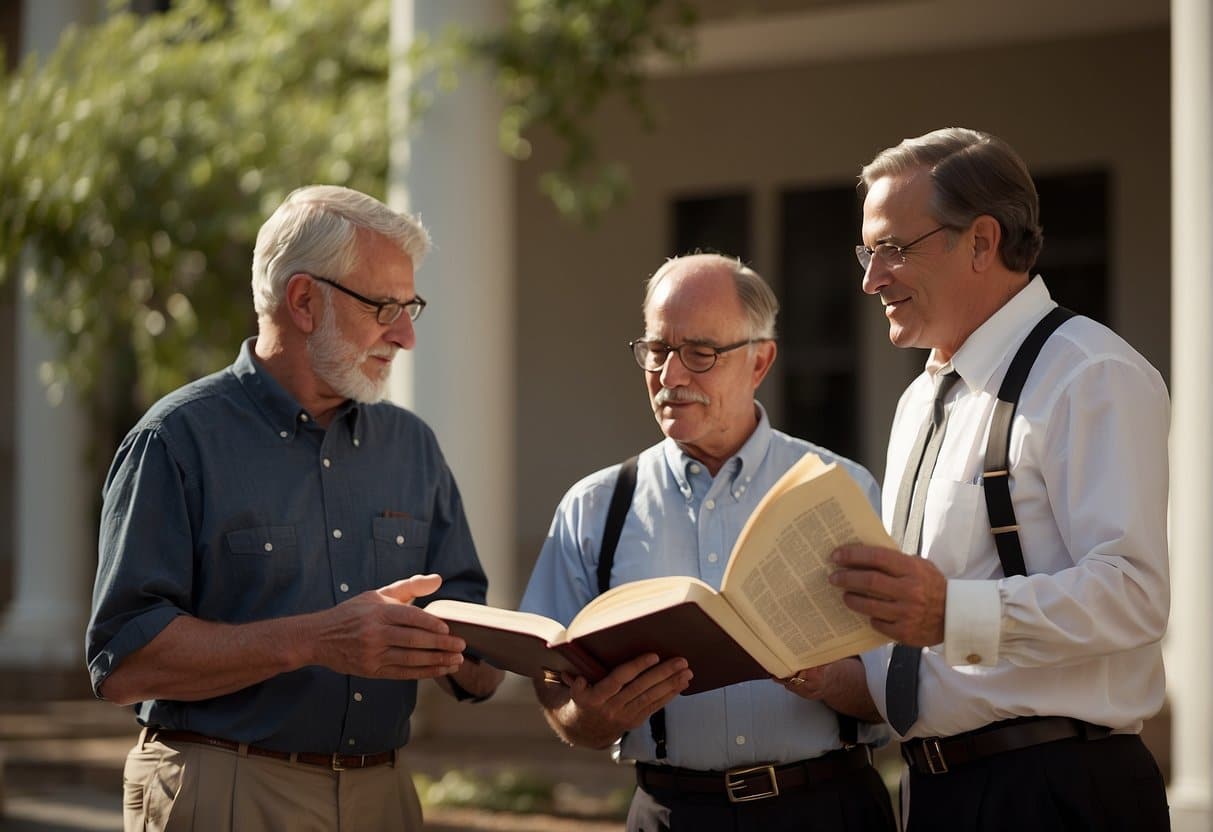If you’re curious about the beliefs of Presbyterians, one question you may have is whether or not they believe in the Trinity.
The Trinity is a fundamental doctrine of Christianity, which teaches that there is one God in three persons: the Father, the Son (Jesus Christ), and the Holy Spirit.
So, what do Presbyterians believe about the Trinity?

Presbyterians believe in the Trinity. According to the Presbyterian Mission Agency, Presbyterians trust in “the one triune God, the Holy One of Israel, whom alone we worship and serve.”
They also trust in Jesus Christ, who is “fully human, fully God.” The Holy Spirit is also a part of the Trinity, and Presbyterians believe that the Spirit “calls, gathers, enlightens, and sanctifies the whole Church.”
Presbyterians also recognize the importance of the Trinity in their worship and theology.
While the Trinity season of the church year is often overlooked, it is the longest season of the church year, beginning eight weeks after Easter and continuing for about half of the calendar year.
Presbyterians understand the Trinity to be a central aspect of their faith and doctrine, and it is something that they hold in high regard.
Historical Development of Trinitarian Belief

Presbyterians are known for their emphasis on the sovereignty of God, but what is their view on the Trinity?
To explore this topic, let’s take a look at the historical development of trinitarian belief.
Biblical Foundations
The doctrine of the Trinity is not explicitly stated in the Bible, but it is implied in various passages.
For example, in Matthew 28:19, Jesus commands his disciples to baptize “in the name of the Father and of the Son and the Holy Spirit.” This threefold formula suggests that three distinct persons share the same divine nature.
Influence of the Nicene Creed
The Nicene Creed, formulated in 325 AD, was a response to the Arian heresy, which denied the full divinity of Christ. The Creed affirmed that the Son is “of one substance with the Father,” and that the Holy Spirit “proceeds from the Father and the Son.”
This Creed has been accepted by most Christian denominations, including Presbyterians, as a faithful expression of trinitarian belief.
Reformed Theology and John Calvin
John Calvin, the influential Reformed theologian of the 16th century, affirmed the doctrine of the Trinity in his writings.
He emphasized the unity of God, while also recognizing the three distinct persons of the Trinity.
Calvin’s view of the Trinity is reflected in the Westminster Confession of Faith, which is the standard of doctrine for many Presbyterian churches.
Presbyterian Doctrine of the Trinity

As a Presbyterian, you believe in the doctrine of the Trinity. This doctrine teaches that there is one God who exists in three persons: the Father, the Son (Jesus Christ), and the Holy Spirit.
The Presbyterian Church (U.S.A.) affirms this doctrine in its Constitution, which includes the Westminster Confession of Faith.
Westminster Confession of Faith
The Westminster Confession of Faith is a statement of faith that was written in the 17th century.
It is one of the most important documents in the history of the Presbyterian Church. The Confession affirms the doctrine of the Trinity and teaches that the Father, the Son, and the Holy Spirit are equal in power and glory.
Understanding God as Triune
The doctrine of the Trinity teaches that God is triune, which means that God exists in three persons.
This can be a difficult concept to understand, but it is an essential part of the Christian faith. As a Presbyterian, you believe that God is one in essence and three in persons.
The Father is the first person of the Trinity. He is the creator of all things and is the source of all life. The Son (Jesus Christ) is the second person of the Trinity. He is the Word of God made flesh and is the Savior of the world.
The Holy Spirit is the third person of the Trinity. He is the comforter and guide who empowers believers to live a life of faith.
Trinity in Worship and Practice
Presbyterians believe in the Trinity and the doctrine of the Triune God. This belief is reflected in their worship and practice.
In this section, we will explore how Presbyterians incorporate the Trinity into their worship and practice.
Prayer and Praise
Presbyterians believe that prayer and praise are essential components of worship. In their prayers and hymns, Presbyterians often address all three persons of the Trinity.
They acknowledge the Father as the Creator and Sustainer of the universe, the Son as the Redeemer and Savior of humanity, and the Holy Spirit as the Sanctifier and Comforter of believers.
Sacraments and Ordinances
Presbyterians practice two sacraments: Baptism and Communion. Both sacraments are seen as visible signs of God’s grace and are administered in the name of the Trinity.
In Baptism, the candidate is baptized in the name of the Father, Son, and Holy Spirit. In Communion, the bread and wine represent the body and blood of Christ, and the Holy Spirit is invoked to bless the elements and the participants.
In summary, Presbyterians believe in the Trinity and incorporate this belief into their worship and practice.
Through prayer and praise, and the administration of sacraments and ordinances, Presbyterians acknowledge the Father, Son, and Holy Spirit as the three persons of the Triune God.
Comparative Theological Perspectives
Presbyterians, like many other Christian denominations, believe in the doctrine of the Trinity. This means that they believe in one God who exists in three distinct persons: the Father, the Son (Jesus Christ), and the Holy Spirit.
However, there are some differences in the way that Presbyterians view the Trinity compared to other Christian traditions.
Differences Between Catholic and Orthodox Views
Catholic and Orthodox Christians also believe in the Trinity, but they have some differences in their understanding of the doctrine.
For instance, both Catholic and Orthodox Christians believe in the concept of the filioque, which states that the Holy Spirit proceeds from both the Father and the Son.
However, Presbyterians do not accept this idea and believe that the Holy Spirit proceeds only from the Father.
Another difference is the way that Catholics and Orthodox Christians view the role of Mary, the mother of Jesus. Both traditions believe in the doctrine of the Immaculate Conception, which states that Mary was born without original sin.
Presbyterians, on the other hand, do not accept this doctrine and see Mary as a faithful servant of God, but not divine.
Contrasts with Non-Trinitarian Denominations
Non-Trinitarian denominations, such as the Jehovah’s Witnesses and the Oneness Pentecostals, do not believe in the doctrine of the Trinity.
Instead, they believe in the concept of monotheism, which states that there is only one God. However, they differ in their understanding of who that one God is.
For instance, the Jehovah’s Witnesses believe that Jesus was a created being and not equal to God. They also believe that the Holy Spirit is not a person, but rather a force or power that comes from God.
Presbyterians, on the other hand, believe that Jesus is the Son of God and is equal to God. They also believe in the personhood of the Holy Spirit.
Contemporary Issues and Debates
Presbyterians have historically affirmed the doctrine of the Trinity, which states that God exists as three distinct persons: the Father, the Son, and the Holy Spirit.
Nevertheless, there are some contemporary issues and debates surrounding this doctrine. In this section, we will explore some of these debates and issues.
Interpretation of Scripture
One of the main debates surrounding the doctrine of the Trinity is the interpretation of scripture. Some argue that the doctrine is not explicitly stated in the Bible and that it was developed by the early church as a way to explain the relationship between God, Jesus, and the Holy Spirit.
Others argue that the doctrine is implicit in the Bible and can be inferred from various passages.
Ecumenical Dialogues
Another issue surrounding the doctrine of the Trinity is ecumenical dialogues. The Presbyterian Church (U.S.A.) has engaged in various dialogues with other Christian denominations, such as the Roman Catholic Church, the Orthodox Church, and the United Methodist Church.
These dialogues have focused on finding common ground and understanding various theological issues, including the doctrine of the Trinity.
Presbyterians also engage in interfaith relations with other religions, such as Judaism and Islam.
These relationships require sensitivity and respect for differences in beliefs and practices.
In summary, while the doctrine of the Trinity is a fundamental belief of Presbyterians, there are still debates and issues surrounding its interpretation and application.
The authority of scripture is central to these debates, and ecumenical dialogues and interfaith relations are important for understanding and respecting other perspectives.
